
Images from Gaza circulating on social media showed a mass detention by the Israeli military of men who were made to strip to their underwear, kneel on the street, wear blindfolds, and pack into the cargo bed of a military vehicle. - Obtained by CNN
Jeremy Diamond, Mohammad Al Sawalhi and Abeer Salman, CNN
Fri, December 15, 2023
Nimer Abu Ras’ wrists are bruised and lacerated. His hands are swollen.
Abu Ras was among a group of six boys and four men interviewed by CNN at Al Aqsa Martyrs Hospital in central Gaza, where they were being treated for injuries and dehydration after being detained for five days.
Like Abu Ras, many of them emerged from Israeli custody with swollen hands and bruised wrists from being handcuffed throughout that time. All of their hands were numbered with red marker by Israeli soldiers. They all told CNN they had been given little food or water during their detention and described instances of alleged abuse and humiliation. A doctor at the hospital said all of them had arrived “physically and psychologically exhausted.”
“They would tie your hands behind your back and drag you like a dog – plastic handcuff scars on your arms. Depending on the mood of one of them, they would come kick you with their boots,” said 14-year-old Mahmoud Zendah, a recent wound marking the bridge of his nose.
Zendah said an Israeli soldier had kicked him in the face.
“I didn’t do anything to him. He just decided to come and kick me,” Zendah said. “He came to me and asked me, ‘Are you Hamas?’ I told him, I don’t know Hamas or the resistance. I’m only a child that goes to school and back home. I eat, I play with my friends and go back home. I don’t do anything else in life.”
Another 14-year-old, Ahmad Nimer Salman Abu Ras, was initially too afraid to even describe his detention.
“I’m afraid,” he said. “I’m scared of the Israelis. I don’t want them to do something to us.”
Like the others being treated at Al Aqsa Martyrs Hospital in the central Gazan city of Deir Al-Balah, they were detained as Israeli forces moved through the Al-Zaytoun neighborhood of Gaza City.
“Suddenly, we heard people screaming and soldiers yelling and bulldozers destroying the houses,” Zendah’s father, Nader, said. “[The soldiers] opened the door of the house and separated women from men, they made us take off our pants and raise our shirts and lined us up against the wall…Then they put us outside of the house and blindfolded us.”
They were then loaded into trucks and taken from one location to another.
“They put us on the floor and put their feet on our heads, they would ask, ‘Are you Hamas?’ and beat [us]. When we wanted to sleep, we couldn’t because it was so cold. And when we asked for something to wear or cover ourselves with, they would beat us,” 16-year-old Mohammad Odeh said.
Forty-year-old Mahmood Esleem, a diabetic, was weak when he arrived at the hospital. His son, Mohammad, who was detained with him, said his father was denied insulin during his detention.
The next day, Esleem appeared to be in even worse shape – barely able to stand, complaining about pain in his foot and slipping in and out of consciousness, according to a cousin who was at his bedside.
“All arrived physically and psychologically exhausted. They came to the hospital halfway walking on foot – ambulances met them halfway. We gave them the needed medical treatment,” Dr. Khalil Al Daqran, the Al Aqsa Martyrs Hospital spokesman said. “There were signs of torture on their arms and signs of beating all over their bodies.”
The Israeli military said it was detaining and questioning individuals “suspected of terrorist activity” as part of its military operations in combat areas in northern Gaza and that “individuals who are found not to be taking part in terrorist activities are released.”
“The individuals detained are treated in accordance with international law,” the Israel Defense Forces said in a statement in response to CNN. “The IDF strives to treat any detainee with dignity. Any incident in which the guidelines were not followed will be looked into.”
A spokesman for the IDF declined to address specific allegations of abuse or provide an explanation for the detention of the 10 boys and men interviewed by CNN, despite being provided with a list of their names and the neighborhood where they were detained.
The IDF also defended its practice of ordering those it detains to undress, saying the practice is “to ensure that they are not concealing explosive vests or other weaponry.”
Human rights groups have decried the photos and their wide circulation online after they emerged in Israeli media.
“Whether the detention is of a civilian or a combatant, the law protects those in detention in custody against degrading and humiliating treatment and outrages upon personal dignity,” said Omar Shakir, Human Rights Watch’s Israel and Palestine Director.
Israeli officials have since claimed to the US that going forward they will give detainees clothes back “immediately” if they conduct strip searches, State Department spokesperson Matt Miller said Wednesday, adding that Israeli officials told their US counterparts that the photos should not have been taken or released.
Civilians can be detained during armed conflict under international law, but only when “absolutely necessary for imperative reasons of security,” Shakir said, adding that Israel has violated those laws before.
Fadi Quran
Thu, December 14, 2023

Palestinians direct a laser toward the Ofer military prison located between Ramallah and Beitunia in the occupied West Bank on Nov. 30, 2023, before the release of Palestinian prisoners in exchange for hostages held by Hamas in Gaza.
On the afternoon of Feb. 24, 2012, Israeli soldiers arrested me during the annual march to reopen Shuhada Street, in the occupied West Bank city of Hebron. The street was once home to a popular market frequented by Palestinians until the Israeli military sealed it off to us in 1994. Palestinians have been protesting to reopen the road, which we call Apartheid Street, every year since 2010.
What happened after my arrest that day still haunts me.
As thousands of us marched toward Shuhada, the Israeli military began firing teargas and rubber bullets. A few of us ran for cover and found ourselves face-to-face with Israeli soldiers. One of my friends was injured after being hit by a teargas cannister, and I started tending to him. But the soldiers began harassing us, and I told them: “We do not fear you. This is Palestine. You should step back.”
The soldiers pepper sprayed me and pinned me to the ground. They slammed my head against a humvee and threw me into the back of the vehicle. About five minutes later, as they drove through the old city of Hebron, the humvee suddenly stopped, Israeli soldiers rushed out, and a boy began screaming. He was handcuffed and thrown in. He had been walking to his sister’s house for lunch when they picked him up.
When we arrived at the Israeli military outpost in the Kiryat Shmona settlement the soldiers dragged us out of the humvee. The kid, who was 14, was terrified. He pleaded with them not to pepper spray him, having seen me not be able to open my eyes. They smacked him around and told him to shut up. They then shackled my feet and had me sit on a bench outside the interrogation room, walking the boy in for questioning first. The Israeli military interrogator told him: “I can make your family’s life hell. But I’ll let you go home. You just need to confirm that the guy with you led the protest and told you to throw the stones at us.” The boy started sobbing and said: “But I don’t know this guy. I just met him when you picked me up.” The interrogator kept pressing him, at one point raising a pistol to his face.

Israeli troops face Palestinian protesters during a demonstration commemorating 18 years to the Hebron massacre and calling to open Shuhada street in the West Bank city of Hebron, Feb. 24, 2012. Nasser Shiyoukhi—AP
The charge brought against this poor kid was stone throwing, based on the “testimony” of Israeli soldiers. The soldiers also accused me of assaulting them, which could have resulted in me spending up to three years in prison. They put me in solitary confinement for two days in a holding cell in the settlement. They then moved me to a heavily crowded underground holding cell in the Maskobiya prison in East Jerusalem, to await a military court hearing.
But as a well-known activist, American citizen, and recent Stanford graduate, my case gained international attention. I was also lucky, as videos of my arrest emerged, showing that I did not assault the soldiers and that their testimony was false.
More From TIME
I was released on Feb. 29 but the child was not as fortunate. I would later learn from prisoner-rights organizations Defence for Children International and Addameer that he spent three months in prison after being advised by lawyers to admit to stone-throwing so he would get out of jail sooner. Waiting for a ruling from Israel’s military courts can take months or more.
This is far from an isolated incident. Between 500-700 children are arrested a year. Israel denies mistreating prisoners but the majority of detained children are beaten, as I was that day, according to research by Save the Children. With a 95% conviction rate, according to the nonprofit Military Court Watch, lawyers and kids know it’s better to “confess” even if they are innocent, as waiting for a ruling and being stuck in limbo in an Israeli jail is hell.
The world has turned a blind eye to this for years. Again and again and again.
Just look at recent events. While the world celebrated the hostage deal and the return of Israeli and Palestinian loved ones to their families, Israel’s revolving door of arrests continued largely unnoticed. Almost as many Palestinians have been arrested as released, according to Palestinian prisoner associations. We know from recent reports from organizations like Military Court Watch as well as graphic videos showing Israeli soldiers beating, abusing, and tormenting children, that many will face what no child ever should.

Israeli soldiers question Palestinians and search houses in the village of al-Tabaqa, near Dura in the southern West Bank region of Hebron, on Feb. 16, 2012. Hazem Bader—AFP/Getty Images
Living in the West Bank, and after years of monitoring child arrests as part of leading Palestinian human rights organization Al-Haq from 2012 to 2014, and now at global civic organization Avaaz, I see the systematic arrest of children as designed to achieve two goals.
The first is what Human Rights Watch and Amnesty International have described as pursuing an “intent to dominate” and “systematic oppression” to maintain the system of apartheid. Palestinian children in the West Bank are often snatched away in the dead of night, subjected to questioning in the absence of any parent or guardian, and languish in pretrial detention for agonizingly long periods. This brutal treatment is not just anecdotal but is reflected in chilling statistics: 72% of Palestinian children arrested in the West Bank endure prolonged custody until the conclusion of legal proceedings, a stark contrast to the 17.9% of Israeli children subjected to similar conditions, according to HRW.
The second goal is to indoctrinate these children with learned helplessness. The military experience suffocates a child’s sense of agency. They can miss a school year, end up being in classes one year younger than their friends, and often have unhealed trauma.
These chilling facts, along with my arrest in 2012, are what inspired me to work with kids in areas with many arrests. I consulted with experts in children’s psychological health, lawyers, activists, and former prisoners to develop a curriculum for what children should do if detained. The training includes walking the children through what to expect, self-awareness and meditation tactics to calm their nerves, and legal knowledge, as well as providing community support for children who have gone through this experience.
Yet this can only do so much. We need all violence against Palestinian children, including arbitrary detention, to end. The world has largely watched in horror as Israel’s bombardment of Gaza has left at least 18,000 people dead, over 7,000 of whom are children, according to Gaza’s health ministry.
The victimization of Palestinian children is profound enough that one Hebrew University law professor has coined a word for it: “Unchilding.” The international community must act to stop the suffering of children, whether they are under bombardment, siege, or in detention.
All children deserve dignity, protection, and a life free from fear. Palestinian children should be no exception.
Hungry, thirsty and humiliated: Israel's mass arrest campaign sows fear in northern Gaza
ISABEL DEBRE and WAFAA SHURAFA
Thu, December 14, 2023
Israeli soldiers stand on Salah al-Din road in central Gaza Strip on Friday, Nov. 24, 2023, as the temporary ceasefire went into effect. The Israeli military has rounded up hundreds of Palestinians across the northern Gaza Strip, separating families and forcing men to strip to their underwear before trucking some to an undisclosed location. The roundups have laid bare an emerging tactic in Israel's ground offensive in Gaza, experts say, as the military seeks to solidify control in evacuated areas in the north and collect intelligence about Hamas operations nearly 10 weeks after the group's deadly Oct. 7 attack on southern Israel.
(AP Photo/Hatem Moussa, File)
DEIR AL-BALAH, Gaza Strip (AP) — The Israeli military has rounded up hundreds of Palestinians across the northern Gaza Strip, separating families and forcing men to strip to their underwear before trucking some to a detention camp on the beach, where they spent hours, in some cases days, subjected to hunger and cold, according to human rights activists, distraught relatives and released detainees themselves.
Palestinians detained in the shattered town of Beit Lahiya, the urban refugee camp of Jabaliya and neighborhoods of Gaza City said they were bound, blindfolded and bundled into the backs of trucks. Some said they were taken to the camp at an undisclosed location, nearly naked and with little water.
“We were treated like cattle, they even wrote numbers on our hands," said Ibrahim Lubbad, a 30-year-old computer engineer arrested in Beit Lahiya on Dec. 7 with a dozen other family members and held overnight. “We could feel their hatred.”
The roundups have laid bare an emerging tactic in Israel’s ground offensive in Gaza, experts say, as the military seeks to solidify control in evacuated areas in the north and collect intelligence about Hamas operations nearly 10 weeks after the group’s deadly Oct. 7 attack on southern Israel. Militants killed about 1,200 people and abducted over 240 that day.
In response to questions about alleged mistreatment, the Israeli military said that detainees were “treated according to protocol” and were given enough food and water. The army spokesman, Rear Adm. Daniel Hagari, said the men are questioned and then told to dress, and that in cases where this didn't happen, the military would ensure it doesn't occur again. Those believed to have ties to Hamas are taken away for further interrogation, and dozens of Hamas members have been arrested so far, he said.
Photos and video showing Palestinian men kneeling in the streets, heads bowed and hands bound behind their backs, sparked outrage after spreading on social media.
To Palestinians, it is a stinging indignity. Among those rounded up were boys as young as 12 and men as old as 70, and they included civilians who lived ordinary lives before the war, according to interviews with 15 families of detainees.
“My only crime is not having enough money to flee to the south,” said Abu Adnan al-Kahlout, an unemployed 45-year-old with diabetes and high blood pressure in Beit Lahiya. He was detained Dec. 8 and released after several hours when soldiers saw he was too faint and nauseated to be interrogated.
Israeli forces have detained at least 900 Palestinians in northern Gaza, estimated Ramy Abdu, founder of the Geneva-based Euro-Med Human Rights Monitor, which has worked to document the arrests. Based on testimony it collected, the group presumes Israel is holding most detainees from Gaza at the Zikim military base just north of the enclave.
The Israeli military declined comment on where the detainees were taken.
Palestinians cowered with their families for days as Israel poured heavy machine-gun fire into Beit Lahiya and Jabaliya, the firefights with Hamas militants stranding families in their homes without electricity, running water, fuel or communications and internet service.
“There are corpses all over the place, left out for three, four weeks because no one can reach them to bury them before the dogs eat them,” said Raji Sourani, a lawyer with the Palestinian Center for Human Rights in Gaza. He said he saw dozens of dead bodies as he made his way from Gaza City to the southern border with Egypt last week.
Palestinians recounted soldiers going door to door with dogs, using loudspeakers to call on families to come outside. In most cases, women and children are told to walk away to find shelter.
Some released detainees described enduring humiliating stretches of near-nudity as Israeli troops took the photos that later went viral. Some guessed they were driven several kilometers (miles) before being dumped in cold sand.
Released detainees said they were exposed to the chill of night and repeatedly questioned about Hamas activities that most couldn't answer. Soldiers kicked sand in their faces and beat those who spoke out of turn.
Several Palestinians held for 24 hours or less said they had no food and were forced to share three 1.5-liter bottles with some 300 fellow detainees.
Darwish al-Ghabrawi, a 58-year-old principal at a U.N. school, fainted from dehydration. Mahmoud al-Madhoun, a 33-year-old shopkeeper, said the only moment that gave him hope was when soldiers released his son, realizing he was just 12.
Returning home brought its own horrors. Israeli soldiers dropped detainees off after midnight without their clothes, phones or IDs near what appeared to be Gaza's northern border with Israel, those released said, ordering them to walk through a landscape of destruction, tanks stationed along the road and snipers perched on roofs.
“It was a death sentence,” said Hassan Abu Shadkh, whose brothers, 43-year-old Ramadan and 18-year-old Bashar, and his 38-year-old cousin, Naseem Abu Shadkh, walked shoeless over jagged mounds of debris until their feet bled.
Naseem, a farmer in Beit Lahiya, was shot and killed by an Israeli sniper as they made their way to a U.N. school in Beit Lahiya, Abu Shadkh said. His brothers were forced to leave their cousin’s body in the middle of the road.
Israeli officials say they have reason to be suspicious of Palestinians remaining in northern Gaza, given that places like Jabaliya and Shijaiyah, in eastern Gaza City, are well-known Hamas bastions.
Human rights groups say mass arrests should be investigated.
“Civilians must only be arrested for absolutely necessary and imperative reasons for security. It's a very high threshold," said Omar Shakir, Human Rights Watch’s regional director.
—-
DeBre reported from Jerusalem.
—-
Full AP coverage at https://apnews.com/hub/israel-hamas-war
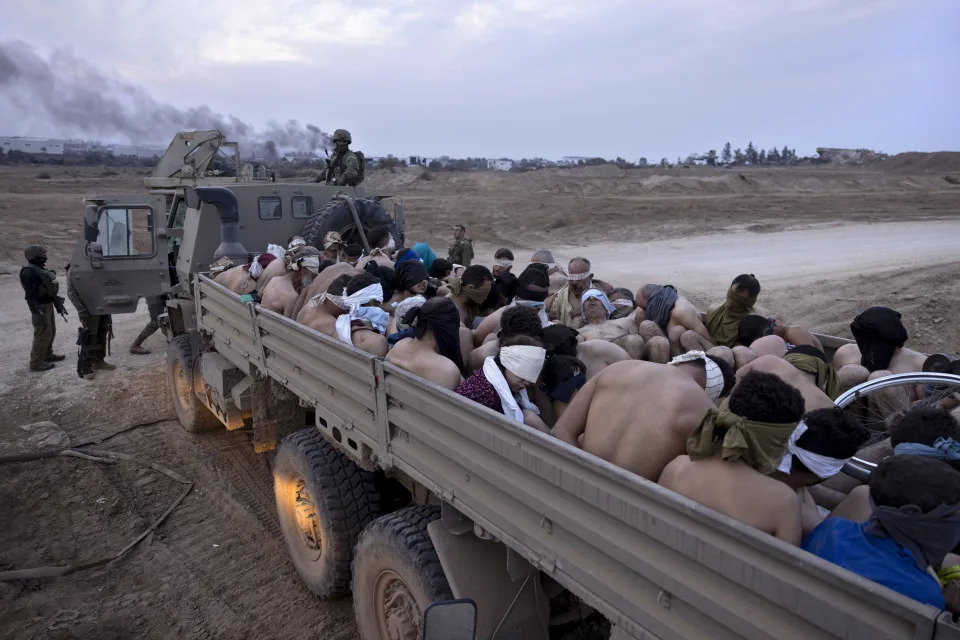
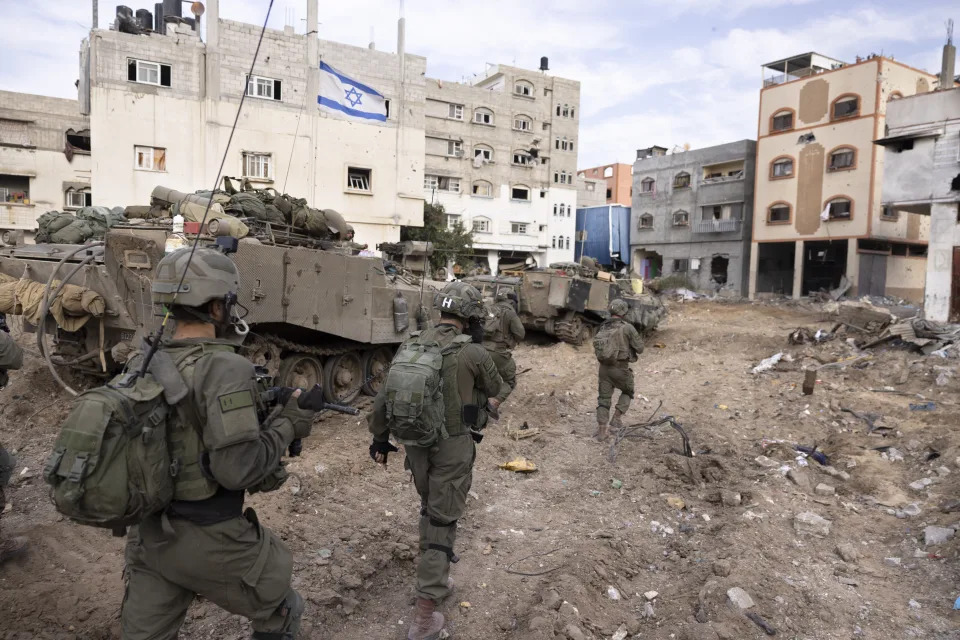
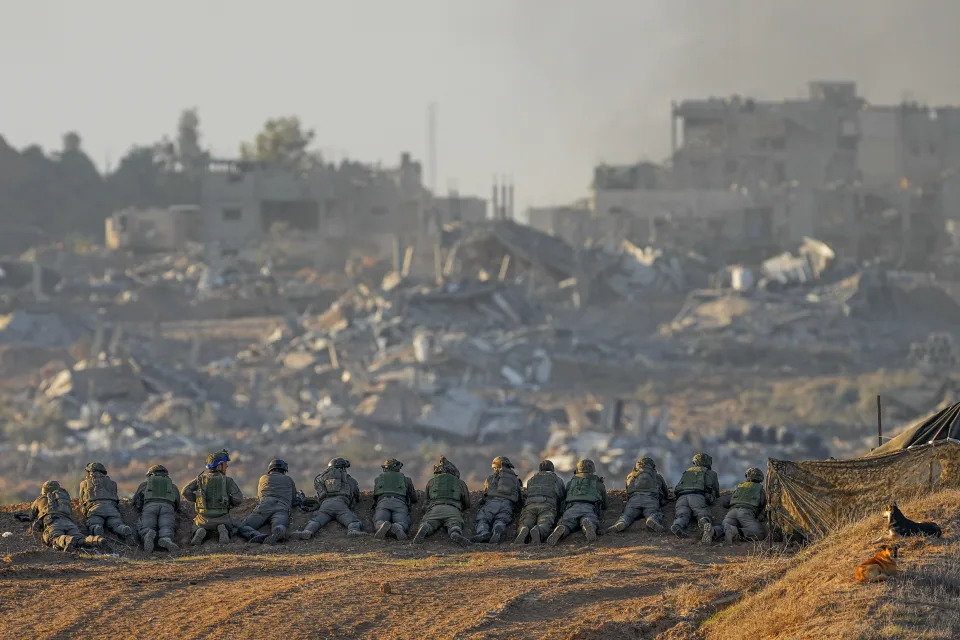
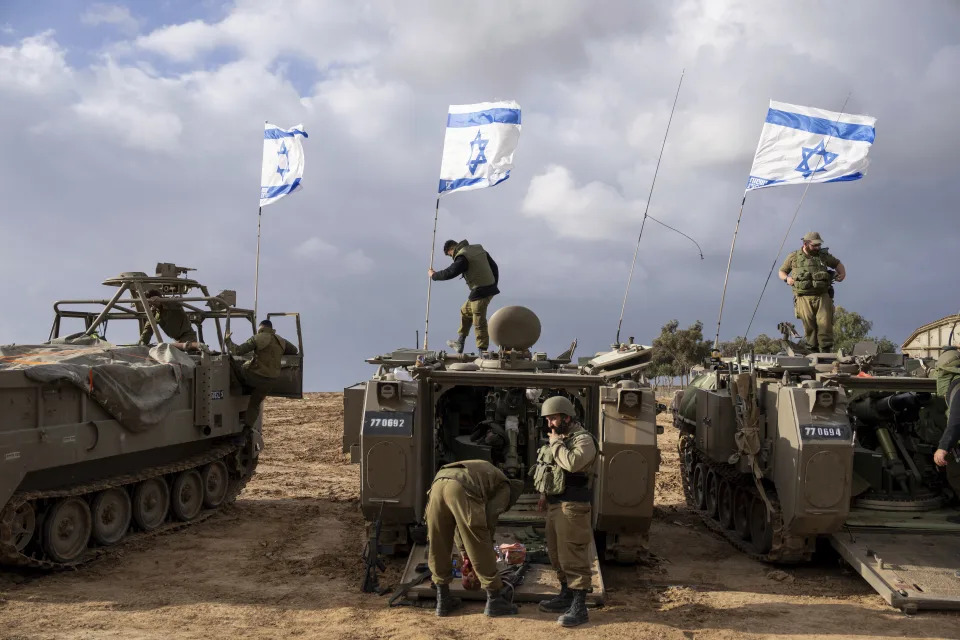
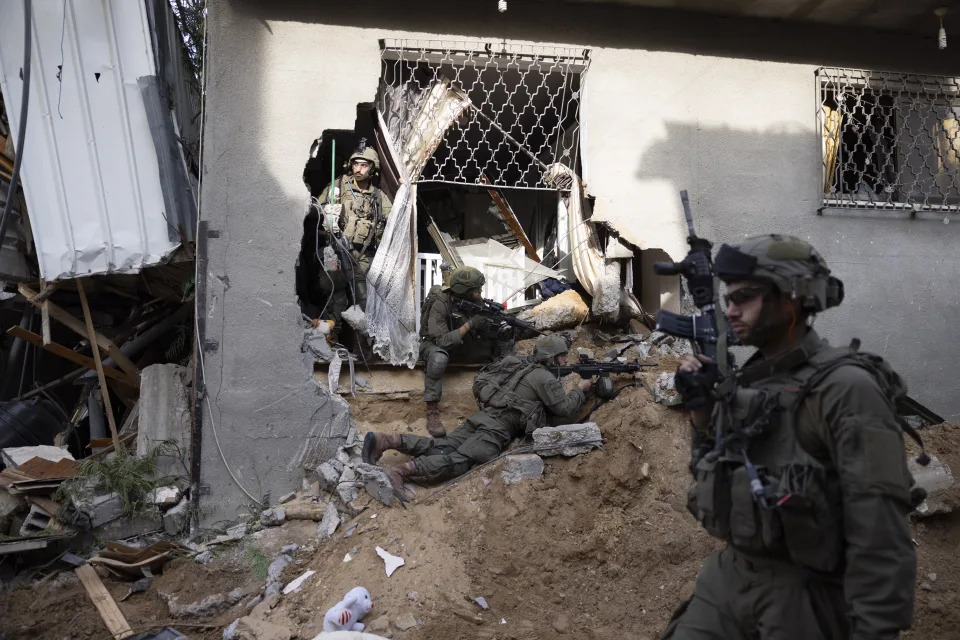
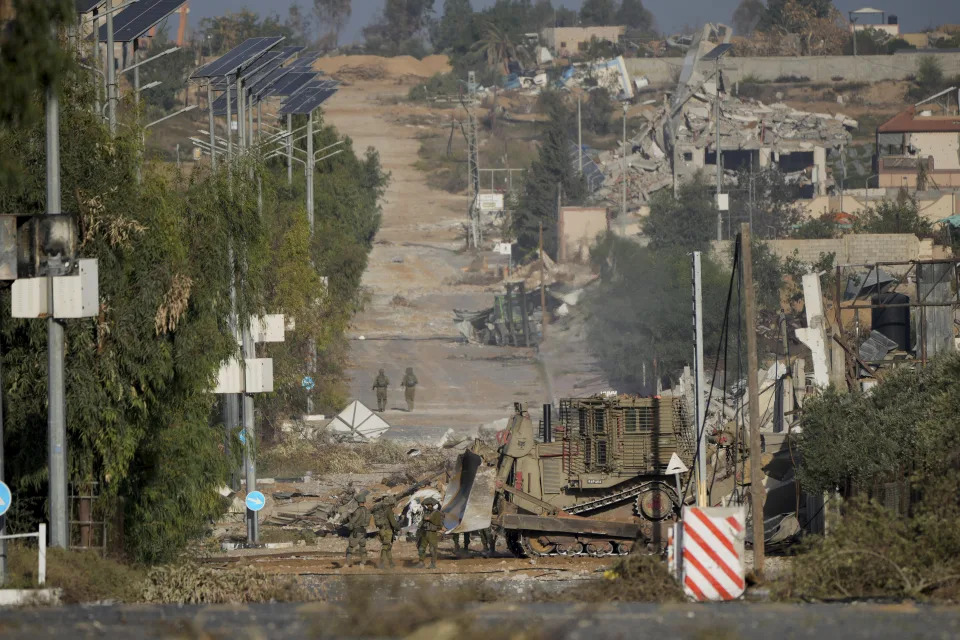
No comments:
Post a Comment